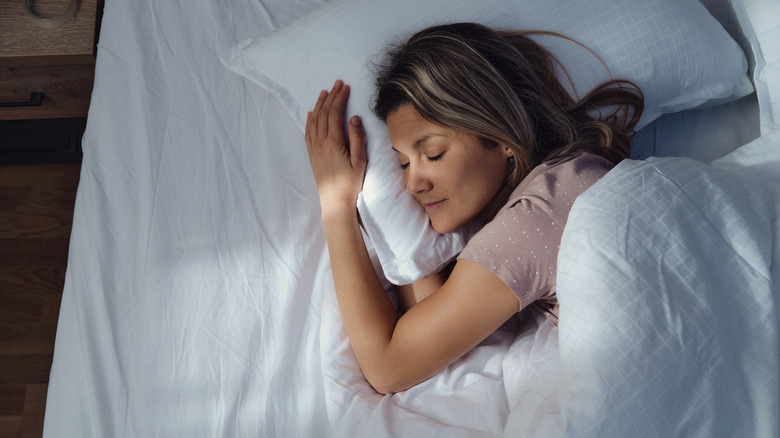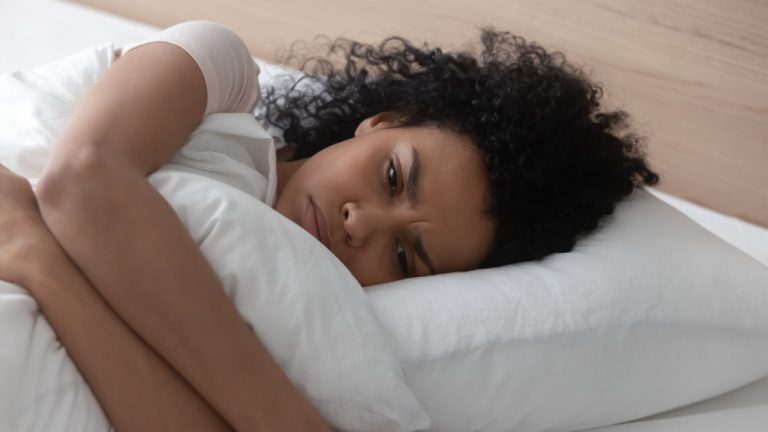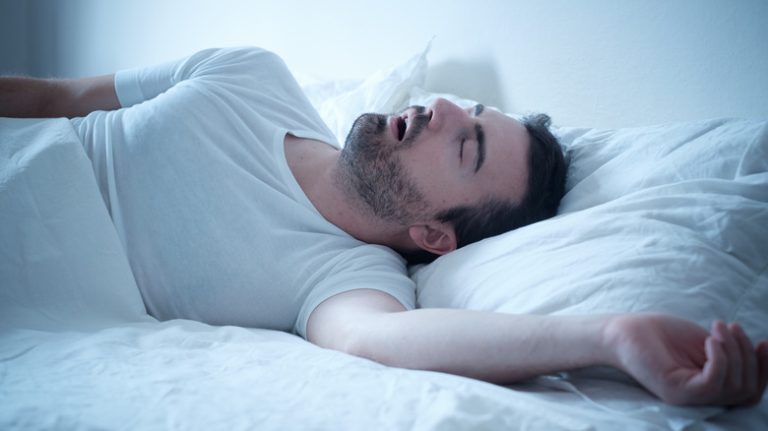The idea of losing weight while you sleep sounds almost fantastical. Sleep gives you the rest you need to get through the day and it supports memory sorting, your immunity, and muscle repair, but do you also wake up a few pounds lighter in the morning?
While the answer is nuanced, science believes that there is such a thing as water weight loss and energy burning that happens while we sleep. Per Healthline, as much as over 80% of weight lost while we sleep has to do with water weight loss. Breathing, sweating, and those nighttime trips to the bathroom to pee are what contribute to water weight loss, per Medical News Today. This is probably why you feel a lot lighter when you wake up in the morning than during other hours of the day.
Furthermore, our body expends energy (albeit in smaller doses than when we’re awake) while we’re asleep. Although the amount is not significant, we burn calories to perform some of the essential functions that happen during sleep, like breathing, digestion, and keeping our heart beating. This is referred to as the basal metabolic rate (BMR). According to Harvard Health, you burn around 40-55 calories an hour when you’re sleeping, but this number is dependent on a few factors, like your sleep quality, diet, age, height, gender, genetics, hormonal conditions, and activity levels. If you thought a lack of sleep affected your mood, you’re right. But turns out, it also affects your weight.
Sleep quality and quantity is an important part of weight loss

Everything from your metabolism, hunger hormone, and stress response is influenced by how much and how well you sleep. And these factors all contribute toward maintaining a healthy weight. According to double board-certified clinical psychologist and clinical sleep specialist, Dr. Michael J. Breus (via Sleep Doctor), a slowing down of metabolism is one effect of sleep deprivation. “There’s a very specific reason for this. It’s because you’re awake and your brain is saying, ‘Why the heck am I awake? I better slow down using those resources because I might need them for energy later on.’ So your metabolism begins to slow down.”
Furthermore, your hunger hormone, ghrelin, and satiation hormone, leptin, are also regulated during sleep, so a lack of proper rest can throw these chemicals into chaos, so to speak. Per board-certified internist and expert in the fields of chronic fatigue syndrome, fibromyalgia, sleep, and pain, Dr. Jacob Teitelbaum (via CNN Health), “People have less of a sense of satiety if they’re not getting enough sleep.” This means that you’re likely to have food cravings or increased hunger when you haven’t gotten proper rest.
A lack of sleep is also linked with an increase in the stress hormone cortisol. Again, this can result in weight gain, because people are prone to craving high-fat or high-caloric foods that increase serotonin levels in their brain when they are stressed, shared Dr. Breus. Practicing proper sleep hygiene and incorporating a few nighttime rituals can aid you in your journey to lose weight.
Healthy bedtime rituals for better sleep (and weight loss)

You may first want to become aware of the things you didn’t realize were ruining your sleep: eating a heavy meal too close to bedtime, drinking alcohol or caffeine, spending time on screens right before you sleep, having an irregular sleep and wake schedule, and not exercising or following a balanced meal plan. As to how much sleep you should get to maintain a healthy weight, anywhere from 7-9 hours a night is what’s recommended for adults.
Exercise has been linked with better daytime alertness and good sleep quality. Plus, engaging in stretching exercises before bed can also improve quality of sleep and aid weight loss, according to cognitive behavioral therapist and certified personal trainer, Nadia Murdock (via Eat This, Not That). “Stretching has been proven to help the body function better by reducing muscle tension. When there’s muscle tension, it can disrupt your adrenal glands and cause cortisol to kick in, causing weight gain.”
Did you know that regulating the temperature in your room can also help you lose weight? Our bodies contain mainly two types of fat: white fat and brown fat. While white fat is what is stored as excess calories in certain parts of our bodies, brown fat is what is generated when our bodies work to maintain a certain level of body temperature. Sleeping in a cool room or wearing fewer clothes while you sleep can promote the creation of brown fat, which in turn boosts calorie burning, per a study done by the National Institutes of Health.




